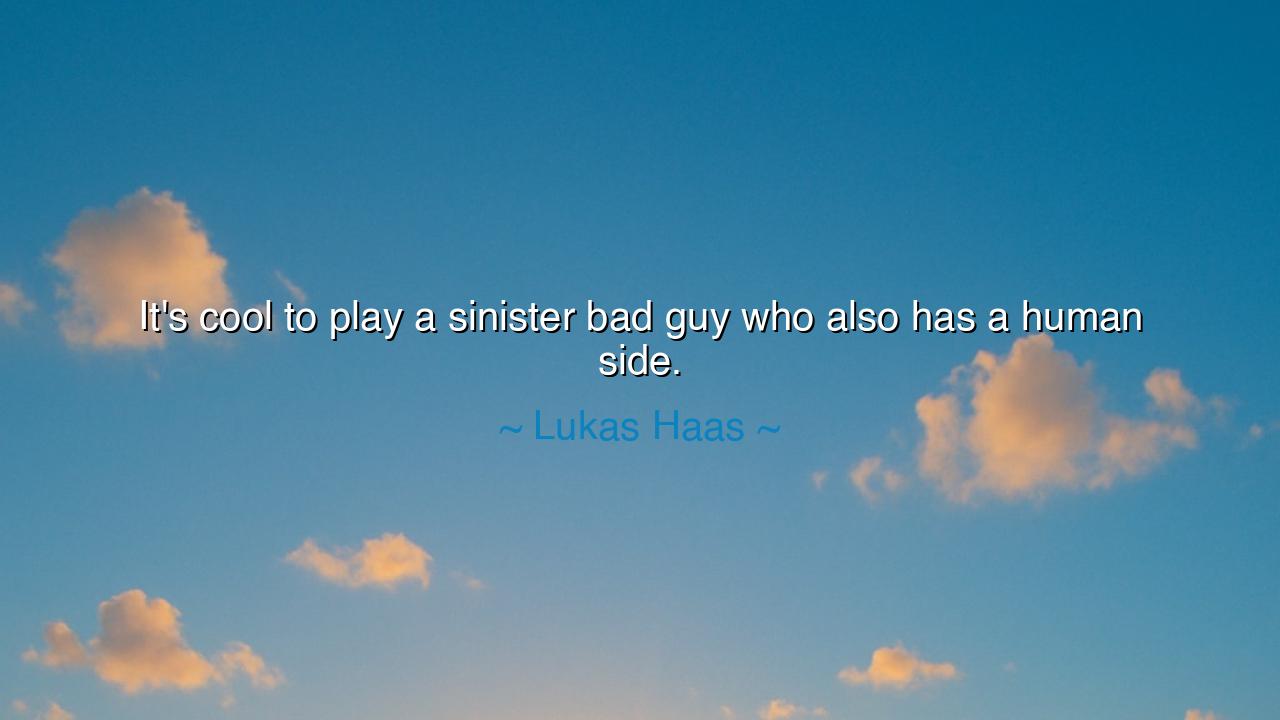
It's cool to play a sinister bad guy who also has a human side.






"It’s cool to play a sinister bad guy who also has a human side," says Lukas Haas, and in this seemingly simple statement, he captures a profound truth about the nature of humanity. The idea that even the most villainous of characters can possess a deeply human side speaks to the complexity of the human condition. It is easy to see the world in black and white—good versus evil, hero versus villain—but such a dichotomy ignores the deeper, more complicated truths of existence. The ancients understood that true character is often a blend of light and shadow, and it is this duality that makes individuals—and by extension, stories—so deeply compelling.
In the Greek tragedies, figures like Oedipus and Creon were not purely good or evil. Their stories were shaped by flaws and virtues, by desires that both elevated them and brought them to ruin. Sophocles, in particular, captured the tension between the hero’s strength and their fatal flaws. Oedipus, for instance, is a king who seeks truth but is ultimately undone by it. He is both noble and tragic, a figure of strength who is deeply human in his vulnerabilities. The essence of these characters is what makes them timeless: they reflect the complicated nature of the human soul, where even those who appear to be evil or flawed are imbued with qualities that make them relatable.
Similarly, Shakespeare’s villains—from the manipulative Iago to the tragic Macbeth—are not simply embodiments of evil. Iago’s jealousy and ambition stem from human insecurities and personal grievances, making him not a mere villain, but a mirror reflecting the darkest corners of human emotion. Macbeth, driven by ambition, faces profound inner conflict—a conflict that reveals the complexity of his character. Shakespeare's villains are multi-dimensional, much like Lukas Haas’s portrayal of a sinister bad guy with a human side. They embody the struggle between the forces that push us toward good and those that pull us into the shadow.
This duality within characters is something that transcends the stage and screen, echoing in the hearts of every individual. The ancient philosophers recognized the tension between our higher and lower instincts. Aristotle, in his work Nicomachean Ethics, spoke of the golden mean, the balance between excess and deficiency, suggesting that true virtue lies in the ability to navigate these extremes. The human condition is not a simple tale of good versus evil, but a journey through complex emotions, desires, and contradictions. Just as Haas finds it “cool” to play a character with both dark and light elements, we too are called to recognize and embrace the complexity within ourselves.
Historical figures like Julius Caesar exemplify this complex nature. Though revered as a leader, Caesar was also deeply ambitious, at times ruthless in his pursuit of power. Yet, his charisma and vision won him the hearts of the people. Caesar’s ambition led to his rise, but it also marked his eventual downfall. His character was not one-dimensional, and his story—filled with both greatness and flaw—remains a testament to the complexity of human nature. The world did not see Caesar simply as a tyrant; they saw the human side of him, the leader with vision and human connection.
The lesson that Lukas Haas’s words offer is this: we must learn to accept and understand the duality within ourselves and others. Life is not about adhering strictly to ideals of good and evil, but rather about recognizing the gray areas that make us who we are. By embracing both our strengths and our flaws, we become more whole—more capable of growth and transformation. Just as Haas takes on the role of a villain with humanity, we too can navigate our own lives with a recognition that our imperfections are as much a part of us as our virtues.
The practical action we can take from this is to look beyond surface-level judgments of others and of ourselves. Recognize the complexity in those we view as “good” or “bad,” and appreciate the fullness of their humanity. We must embrace the idea that growth often comes through confronting our darker sides and learning from them. Just as a great actor embraces the complexity of a character, we too must embrace the full range of our emotions and experiences. By doing so, we can transform our own stories into ones of growth, understanding, and ultimately, empowerment. Embrace complexity—for it is within the shadows that we often find our brightest light.






AAdministratorAdministrator
Welcome, honored guests. Please leave a comment, we will respond soon